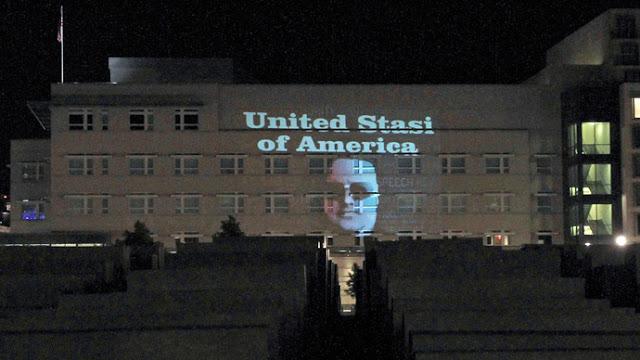"Obviously, the United States is not now a police state. But given the extent of this invasion of people's privacy, we do have the full electronic and legislative infrastructure of such a state. If, for instance, there was now a war that led to a large-scale anti-war movement – like the one we had against the war in Vietnam – or, more likely, if we suffered one more attack on the scale of 9/11, I fear for our democracy. These powers are extremely dangerous."
"The NSA, FBI and CIA have, with the new digital technology, surveillance powers over our own citizens that the Stasi – the secret police in the former "democratic republic" of East Germany – could scarcely have dreamed of. Snowden reveals that the so-called intelligence community has become the United Stasi of America. (las negrillas son mías)."

"Snowden reveals that the so-called intelligence community has become the United Stasi of America." Y aquí encuentro apropiado colgar esta foto. Kim Dotcom, leyenda viva de la cibercultura, y letras blancas que leen United Stasi of America. La pared a la que se proyectó esta imagen la noche del 8 de julio del 2013, es de la embajada estadounidense en Berlin. Y fue repartida en las calles de la capital alemana el 9 de julio. El artista alemán, Oliver Bienkowski, proyectó la imagen en territorio estadounidense. Puede enfrentar cargos criminales.
¿Vivimos en un estado policial? ¿Tenemos que pegarle un pedazo de tape a la cámara de nuestras computadoras? Snowden, Manning, Assange, Schmitz: ¿mártires posmodernos? We, 1984, Brave New World: ¿profecías a punto de cumplirse? La poderosa pieza de Bienkowski hace obligatoria estas preguntas.También puede motivar otra: ¿Qué es 'Stasi'? Cuelgo The Lives of Others (2006) para contestarla. Vale la pena examinar la actualidad vía el arte. Y considero la obra de von Donnersmarck--genialmente situada en el año 1984--tan pertinente como la de Bienkowski:
Mi gestión es este blog es considerablemente ingenua (naive). Si cumple con el fin de satisfacer una necesidad, la de pensar. Se espera un intercambio de ideas, a la luz de temas discutidos en las artes literarias, filosofía, actualidad, ciencias, etc.

